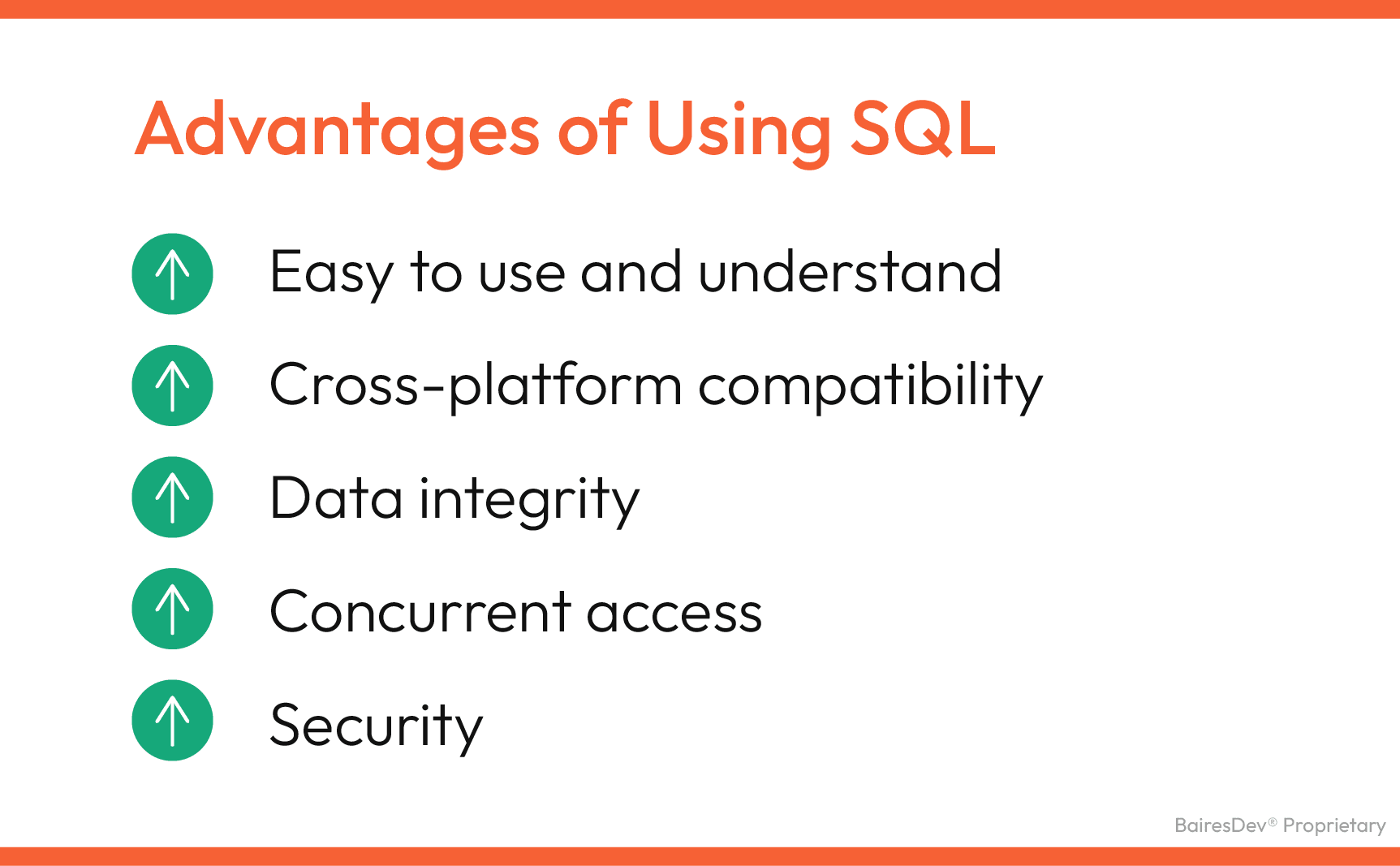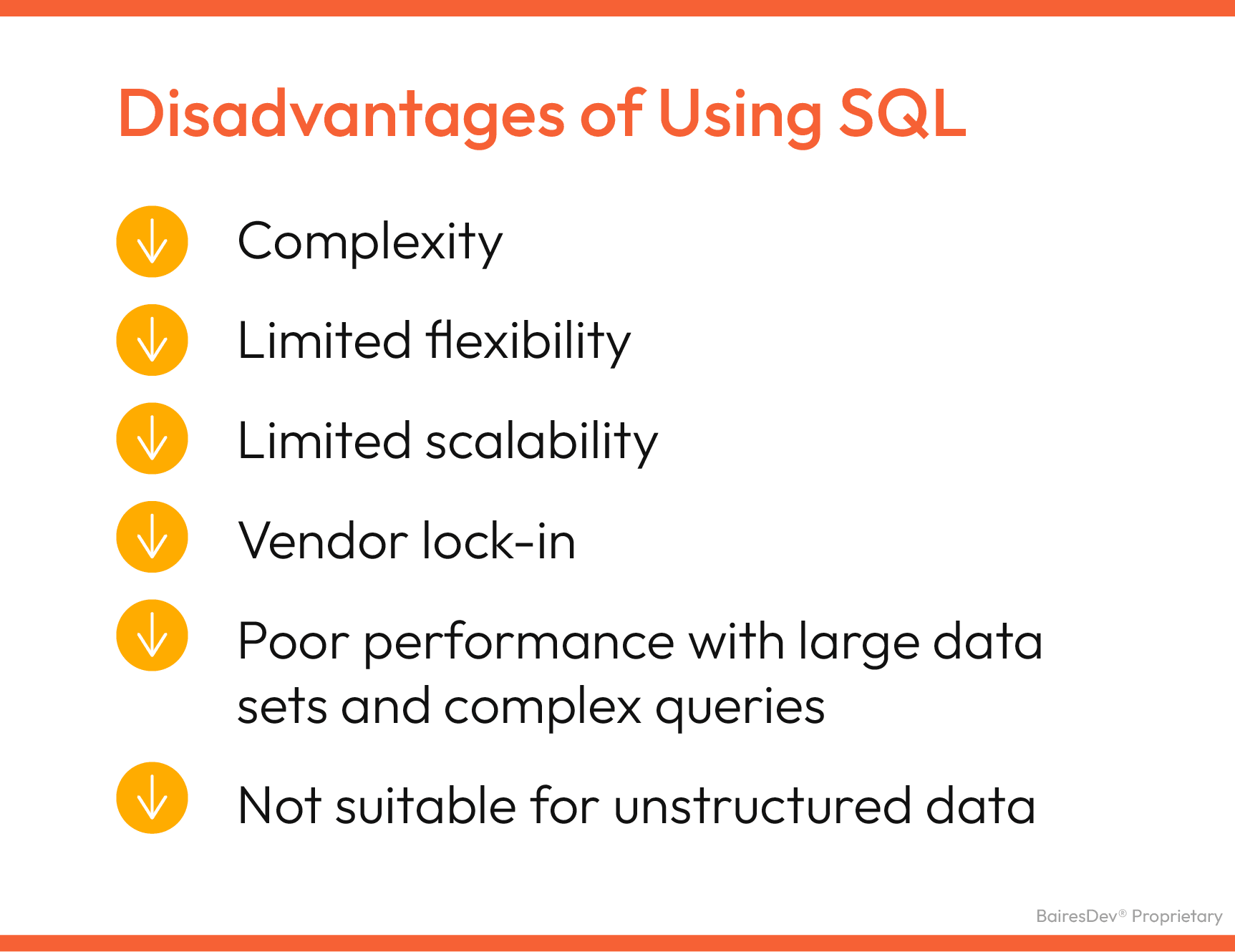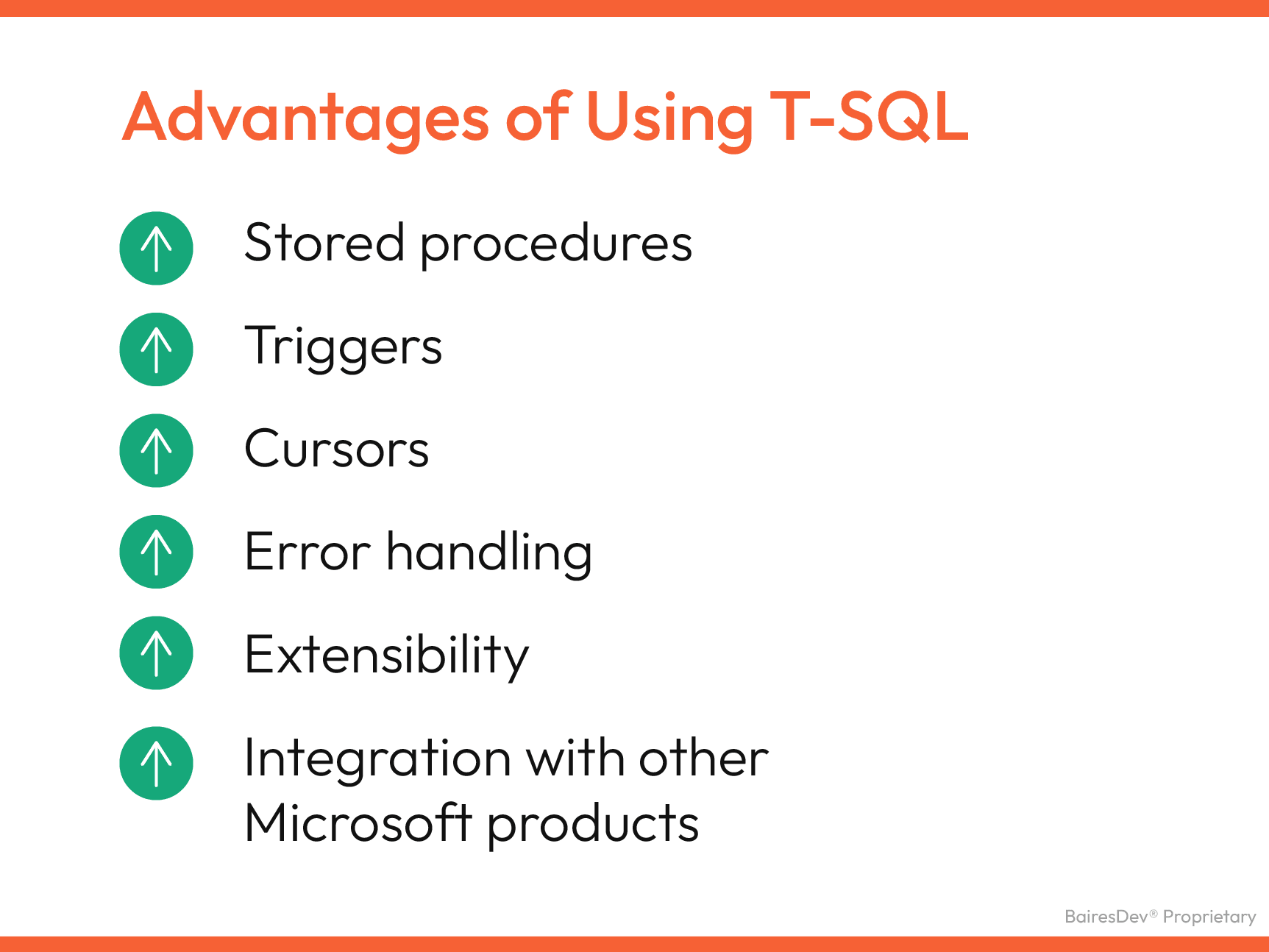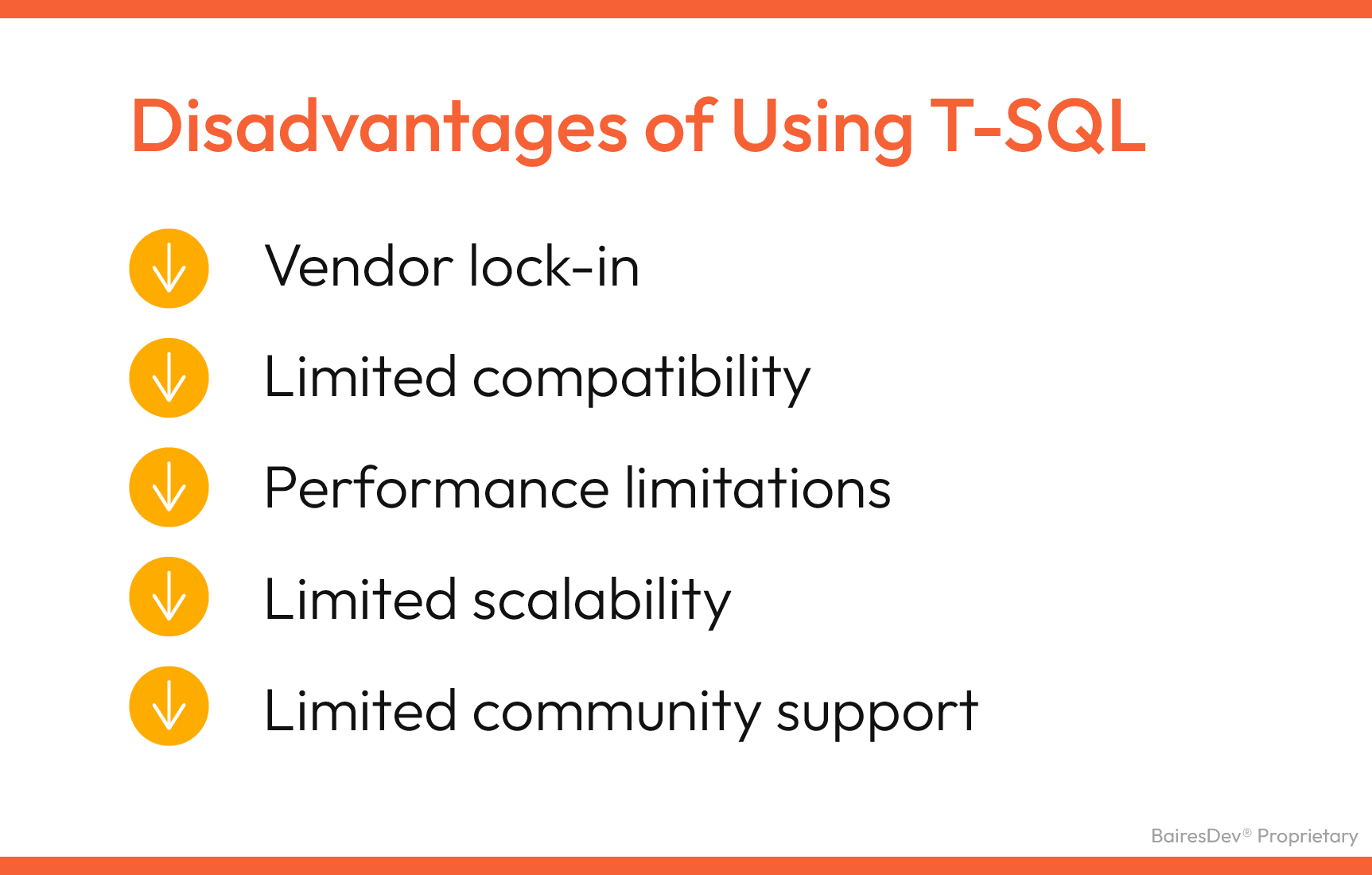The SQL vs. T-SQL debate is long-standing in the world of database development. Both languages have advantages and disadvantages, and the decision of which to use often comes down to personal preference. That said, some key differences between the two should be considered when deciding. By the end of this article, you will have a good understanding of the key differences between SQL and T-SQL and be able to choose the right language for your needs.
What Is SQL?
Structured Query Language (SQL) is a programming language used to communicate, manage, and manipulate relational databases and perform tasks such as inserting, updating, and querying data. SQL is the standard language for relational database management systems and is used by many popular databases such as MySQL, Oracle, and Microsoft SQL Server. Some additional details and facts of SQL include:
| SQL | Details |
| Origin | Invented in the early 1970s by IBM researchers Donald D. Chamberlin and Raymond F. Boyce, SQL’s initial development was aimed at creating a standard language for managing and manipulating relational databases. |
| Usage | SQL is one of the most widely used programming languages for managing and manipulating data stored in databases. It is used by many different types of organizations and is supported by a wide range of database management systems, including MySQL, Oracle, and Microsoft SQL Server. |
| Popularity | According to the TIOBE Index, which ranks the popularity of programming languages, SQL has consistently ranked in the top 20 most popular programming languages. |
| Key features |
|
Advantages of Using SQL

There are several advantages to using SQL for managing and manipulating relational databases. The advantages include the following:
- Easy to use and understand: SQL is a high-level language, meaning it is closer to human language than machine language. This makes it more user-friendly and easier to use and understand.
- Cross-platform compatibility: SQL is an industry-standard language, which means that it can be used with many different types of relational databases, including MySQL, Oracle, and Microsoft SQL Server.
- Data integrity: SQL provides several mechanisms for maintaining data integrity, such as constraints and triggers, which help ensure that data entered into the database is accurate and consistent.
- Concurrent access: SQL supports concurrent access to the database, allowing multiple users to read and update the data at the same time.
- Security: SQL provides several mechanisms for securing data, such as user accounts and permissions, which help ensure that only authorized users can access the data in a database.
Disadvantages of Using SQL

While SQL is a powerful and widely used language for managing and manipulating relational databases, there are also some disadvantages to using it:
- Complexity: As the size and complexity of a database increases, the SQL statements required to manage and manipulate it can become increasingly complex. This can make it difficult for nontechnical users to understand and work with the data.
- Limited flexibility: SQL is a declarative language that describes what data is needed but not how to get it. This can make it less flexible than other types of programming languages regarding data manipulation.
- Limited scalability: SQL databases are limited in their scalability, as they are not designed to handle the large amounts of data and high traffic loads of some modern applications.
- Vendor lock-in: Some SQL databases are proprietary, meaning they can only be used with specific vendors’ products. This can make it difficult and costly to switch to another database in the future.
- Poor performance with large data sets and complex queries: As the amount of data and complexity of the query increases, the performance of the SQL query can degrade significantly.
- Not suitable for unstructured data: SQL is not suitable for unstructured data like images, videos, and audio files.
What Companies Use SQL?
With a range of features trusted by top SQL development companies and some of the biggest corporations in the world, SQL is the established database query language that the world relies on. Some of the companies using SQL include, but are not limited to:
- Technology companies such as Google, Facebook, and Microsoft
- Financial institutions such as JPMorgan Chase and Wells Fargo
- Retail companies such as Walmart and Amazon
- Healthcare providers such as UnitedHealth Group and Kaiser Permanente
- Manufacturing companies such as General Electric and Boeing
What Tools Integrate With SQL?
There are many tools that integrate with SQL, as SQL is a widely used language for managing relational databases. Here are a few examples:
- Database management systems (DBMS) such as MySQL, PostgreSQL, and Microsoft SQL Server
- Data visualization tools such as Tableau, Power BI, and QlikView
- Business intelligence (BI) tools such as SAP BusinessObjects and IBM Cognos
- Data integration tools such as Informatica and Talend
- Data science and machine learning tools such as R and Python (with libraries such as pandas and SQLAlchemy)
- Software development tools such as Visual Studio and Eclipse (with plugins such as SQL Server Management Studio and DataGrip)
These tools can be used to connect to SQL databases, extract data, perform analysis, create visualizations and reports, and more.
What Is T-SQL?
Transact-SQL (T-SQL) is a programming language for managing and manipulating relational databases. It is a proprietary extension to the SQL standard, developed by Microsoft for use with its SQL Server database management system. T-SQL includes several features not found in standard SQL, such as support for stored procedures, triggers, and cursors, as well as a wide variety of data manipulation and control statements. Some additional details and facts about T-SQL include:
| T-SQL | Details |
| Origin | T-SQL, which stands for Transact-SQL, is a proprietary variant of SQL developed by Microsoft. It is used to manage and manipulate data in Microsoft SQL Server databases. |
| Usage | T-SQL is widely used by organizations that use Microsoft SQL Server as their database management system. It is a powerful and flexible programming language that is well suited for managing and manipulating data in various contexts. |
| Popularity | T-SQL is a popular programming language among developers who work with Microsoft SQL Server. According to the TIOBE Index, which ranks the popularity of programming languages, T-SQL has increased in popularity, ranking in the top 30 most popular programming languages. |
| Key features |
|
Advantages of Using T-SQL

T-SQL has some advanced features and capabilities not found in standard SQL. The advantages include the following:
- Stored procedures: T-SQL supports stored procedures, which are pre-compiled sets of SQL statements that can execute with a single call. This can improve performance by reducing the amount of parsing and compilation needed each time the procedure is called.
- Triggers: T-SQL supports triggers, which are special procedures automatically executed in response to specific events, such as data changes. Triggers can be used to enforce business rules or perform other tasks automatically.
- Cursors: T-SQL supports cursors, which allow you to iterate through a result set one row at a time rather than retrieving the entire result set at once. This can be useful when working with large result sets or when performing complex data manipulation.
- Error handling: T-SQL provides robust error-handling capabilities, allowing you to handle errors and exceptions in a controlled way.
- Extensibility: T-SQL allows for the creation of user-defined functions and types, which can be used to extend the functionality of the language.
- Integration with other Microsoft products: T-SQL is tightly integrated with other Microsoft products, such as Visual Studio and the .NET Framework, making it easy to build integrated applications.
Overall, T-SQL provides many capabilities that make it a powerful tool for managing and manipulating relational databases. With T-SQL including several features not found in standard SQL, you can reap these advantages quickly using T-SQL development services.
Disadvantages of Using T-SQL

While T-SQL offers some advanced features and capabilities not found in standard SQL, it also has some drawbacks that users should know. Some disadvantages of T-SQL include:
- Vendor lock-in: T-SQL is specific to Microsoft SQL Server, so code written in T-SQL may not be easily portable to other database management systems.
- Limited compatibility: While T-SQL is similar to ANSI SQL, it does include some proprietary features that may not be compatible with other systems.
- Performance limitations: T-SQL can be less efficient for particular queries or operations than other programming languages or libraries for data analysis and manipulation.
- Limited scalability: While Microsoft SQL Server can scale to handle large amounts of data, T-SQL may not be the best choice for extensive data sets or high-performance computing environments.
- Limited community support: While T-SQL has a large user base, it is not as widely used as more general-purpose programming languages like Python, R, or Java, which have larger communities and more available libraries and frameworks.
What Industries Use T-SQL?
Many companies use T-SQL in conjunction with Microsoft SQL Server to manage and manipulate their data. Some examples of industries that use T-SQL include:
- Finance: Banks, insurance companies, and other financial institutions use T-SQL to manage and analyze large amounts of financial data.
- Healthcare: Hospitals, pharmaceutical companies, and other healthcare organizations use T-SQL to manage and analyze patient and medical data.
- Retail: Many retailers use T-SQL to manage and analyze sales and customer data.
- Manufacturing: Manufacturing companies use T-SQL to manage and analyze production and inventory data.
- Government: Many government agencies use T-SQL to manage and analyze data for things like census data, tax data, and other records.
- Technology: Many technology companies use T-SQL to manage and analyze data for various purposes like online transactions, customer service and support, and user analytics.
These are just some examples of the many industries that use T-SQL in conjunction with Microsoft SQL Server to manage and analyze their data.
What Tools Integrate With T-SQL?
There are a variety of tools that integrate with T-SQL to help manage and analyze data stored in a Microsoft SQL Server database. Some examples include:
- SQL Server Management Studio (SSMS): A graphical user interface for managing and interacting with SQL Server databases, including the ability to write and execute T-SQL code.
- Visual Studio: A development environment that allows for the creation of T-SQL code and integration with other programming languages, such as C# and Visual Basic.
- SQL Server Integration Services (SSIS): A tool for integrating data from a variety of sources, including the ability to use T-SQL for data transformation and manipulation.
- Power BI: A business intelligence tool that allows users to connect to a variety of data sources, including SQL Server, and create interactive visualizations and reports, with the ability to use T-SQL for data querying.
- Tableau, Looker, QlikView, and other BI tools can also connect and query data from SQL Server databases using T-SQL.
These are just a few examples of the many tools that integrate with T-SQL to help manage and analyze data stored in a Microsoft SQL Server database.
Key Differences Between SQL & T-SQL
SQL (Structured Query Language) and T-SQL (Transact-SQL) are both programming languages used to manage and manipulate data in relational databases. Still, there are some key differences between them:
| Feature | SQL | T-SQL |
| Ease of learning | SQL is considered a relatively easy programming language with clear and concise syntax and many resources available for learning. | T-SQL includes additional features and capabilities beyond those found in standard SQL, which may make it slightly more difficult for beginners to learn. |
| Performance | SQL is a high-performance language optimized for querying and manipulating data in relational databases. | T-SQL is also a high-performance language with additional features and capabilities that may improve the performance of certain types of queries and operations. |
| Standardization | SQL is a standardized language with a well-defined syntax and structure, making it easy to write portable code with various database management systems. | T-SQL is a proprietary variant of SQL, which means that only Microsoft SQL Server supports it. It may not be as portable as standard SQL. |
| Security | SQL includes several security features, such as protection against injection attacks and user authentication and permissions support. | T-SQL includes the security features of standard SQL and additional features and capabilities specific to Microsoft SQL Server. |
It’s worth noting that T-SQL is an extension of SQL, and it includes additional functionality that is not part of the standard SQL but still follows SQL’s syntax and commands.
Exploring the Future: A Look Ahead
SQL is a widely used language for managing and manipulating data in relational databases, and its popularity is still increasing. SQL is not waning; instead, it is being used in conjunction with other technologies.
The sector is moving toward a variety of standards, as there are several different implementations of SQL, such as T-SQL (used by Microsoft SQL Server), PL/SQL (used by Oracle), and MySQL (used by MySQL). However, most relational databases widely support and use the SQL standard, making it a valuable skill for developers and data professionals.
There is more competition in the sector, with new technologies like NoSQL databases and big data platforms like Hadoop and Spark gaining popularity. These technologies offer alternative ways to store and process large amounts of data, but they don’t replace SQL; they are just complementary to it.
Some of the new technologies that are up and coming in the sector are:
- Cloud-based data services such as AWS Redshift, Google Bigquery, and Azure Synapse Analytics, which are gaining popularity as they provide scalability, flexibility, and cost-efficiency
- Graph databases like Neo4j and JanusGraph, which are used to store and query large amounts of data with complex relationships
- Time-series databases like InfluxDB and TimescaleDB, which are optimized for storing and querying time-stamped data
These new technologies are not replacing SQL but providing new ways to handle specific use cases. They’re being used in conjunction with SQL to offer more data analytics and management capabilities.
SQL vs. T-SQL: Who Wins?
SQL and T-SQL both have their strengths and are used in different contexts. SQL is a standard language for relational databases and is supported by a wide range of database management systems, including Microsoft SQL Server, Oracle, MySQL, and PostgreSQL. It is widely used and has a large community of developers and data professionals who support it.
On the other hand, T-SQL is a proprietary language explicitly used with Microsoft SQL Server. It includes additional functionality and syntax that are not part of the SQL standard, making it more powerful and flexible than SQL. T-SQL is also more integrated with other Microsoft technologies and tools.
In summary, SQL is more widely supported and used, and it’s a valuable skill for developers and data professionals who work with relational databases. T-SQL is more powerful and flexible, and it’s a valuable skill for developers and data professionals who work specifically with Microsoft SQL Server. The winner ultimately depends on the context and the specific use case. Both have their own strengths and can be used effectively in the right scenario.
FAQ
Can I use SQL and T-SQL interchangeably in all database systems?
No, SQL and T-SQL cannot be used interchangeably in all database systems. SQL is a standard language for accessing and manipulating databases, while T-SQL is a proprietary extension used specifically for Microsoft SQL Server.
Are there any performance differences between SQL and T-SQL?
Yes, there can be performance differences between SQL and T-SQL, depending on the complexity of the queries and the specific database system being used. T-SQL, with its additional features and functions, may offer more efficient ways to handle complex queries in Microsoft SQL Server.
Can I use the same tools for both SQL and T-SQL development?
Some tools can be used for both SQL and T-SQL development, but others are specific to either SQL or T-SQL. It’s important to choose tools that are compatible with the database system and language you are using.
Is T-SQL only beneficial for large-scale enterprises, or can small businesses also benefit from it?
T-SQL can be beneficial for businesses of all sizes. While large-scale enterprises might leverage its advanced features for complex databases, small businesses can also benefit from its efficiency and integration with Microsoft SQL Server for managing their data needs.






